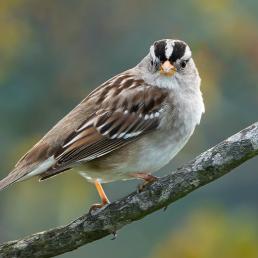

Join BirdNote tomorrow, November 30th!
Illustrator David Sibley and actor H. Jon Benjamin will face off in the bird illustration battle of the century during BirdNote's Year-end Celebration and Auction!
Common Poorwills don’t sing much when the mercury drops. But they can do something else that is remarkable. As the winter cold deepens, these petite members of the nightjar family can enter a hibernation-like state — and stay like that for hours — or even weeks! Scientists call it torpor. It happens when an animal slows its body functions to conserve energy and heat.
BirdNote®
Common Poorwills Can "Hibernate"
By Monica Gokey
This is BirdNote.
[sounds of Common Poorwill]
When it’s summer in the Southwest, the call of a Common Poorwill greets the moonrise.
[repeat call]
But in winter… quiet.
[silence ]
The Common Poorwill doesn’t sing much when the mercury drops. But it can do something else that is remarkable. As the winter cold deepens, this petite member of the nightjar family can enter a hibernation-like state — and stay like that for hours — or even weeks!
Scientists call it torpor. It happens when an animal slows its body functions to conserve energy and heat. The bird’s heart rate will slow; so does its breathing and body temperature.
Several species of birds can go into brief states of torpor to conserve energy — hummingbirds, doves, and the poorwill’s close cousin, the whip-poor-will.
[call of a whip-poor-will].
But the Common Poorwill is unique in its ability to do so for such prolonged periods of time.
Scientists suspect there may have been an evolutionary advantage for the poorwill if it could stick out the winter, instead of migrating.
The poorwills that stay through the cold come out of their torpor as the temperature rises, the days lengthen, insects become abundant again, and the breeding season nears… and that is something to sing about.
[call of a Common Poorwill again]
For BirdNote, I’m Michael Stein.
###
Bird sounds provided by The Macaulay Library of Natural Sounds at the Cornell Lab of Ornithology, Ithaca, New York. Recorded by: ML40634 G Keller; ML 195774 B McGuire. Plus Nature Sound 02 Wind mod soft.
BirdNote’s theme composed and played by Nancy Rumbel and John Kessler.
Producer: John Kessler
Managing Producer: Jason Saul
Associate Producer: Ellen Blackstone
© 2019 Tune In to Nature.org February 2019/2020 / January 2023 Narrator: Michael Stein
ID# COPO-02-2019-02-01
References
Birds frequently entered torpor for longer than 10 days, and up to 25 days; good discussion on possible evolutionary advantage of torpor. https://www.uregina.ca/science/biology/people/faculty-research/brigham-…
https://www.journals.uchicago.edu/doi/abs/10.1086/physzool.65.2.30158263 poorwills of both sexes enter torpor regularly in April, May, and September, but not during the breeding season. I found no evidence that torpor was used only in energy emergencies or that the lunar cycle influenced the use of torpor.
http://www.bioone.org/doi/abs/10.1676/06-067.1 Most calling occurs between May and Sept. (no poorwill sounds during winter)



